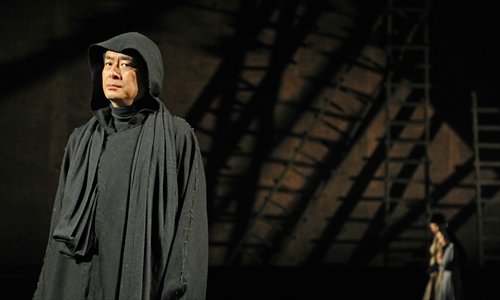HOME >> ARTS
A thousand possibilities
By Liao Danlin Source:Global Times Published: 2014-4-15 21:08:02

Actor Pu Cunxin in Coriolanus Photo: Courtesy of NCPA.
Shakespeare once wrote that "there are a thousand hamlets in a thousand people's eyes." However, nowadays it would probably be more appropriate to say "there are a thousand hamlets on a thousand stages" as audiences are able to enjoy numerous different adaptations of Shakespeare's plays around the world - not only traditional adaptations, but also monodramas, physical dramas, dance shows and operas.To celebrate the 450 anniversary of Shakespeare's birth, from April to November the National Centre of Performing Arts (NCPA) in Beijing will host a whole season of Shakespeare performances, including a number of the most reputable adaptations made in recent years.
The National Theatre of Scotland and Royal Shakespeare Company co-produced Dunsinane based on The Tragedy of Macbeth, Shanghai Drama Art Center's The Taming of the Shrew, Beijing People's Art Theatre's Coriolanus and five other Shakespeare classics are all on the list.
Infinite interpretations
Shakespeare has always been a respected figure, even today. Every year, dozens of new productions are staged around the world, in addition to those performed at Shakespeare's Globe Theatre.
"The traditional impression of Shakespeare's works is that the themes are ancient - mostly about love, death, conspiracy and hatred. However, if you see how his plays have been adapted and reinterpreted again and again, sometimes very subversively, you will find certain connections to our daily lives through his works," theater critic and theater festival planner Crystal told the Global Times.
For Crystal, this "immutability," as she calls it, not only belongs to Shakespeare's works, but more accurately is part of human nature and how people react when facing complicated situations.
Crystal mentioned how she saw the British National Theatre's modern version of Othello, where the protagonist was a military leader in Cyprus, last year.
"I didn't buy the story before because I felt the reasons why Othello becomes jealous, easily believes rumors and eventually kills his wife, weren't sufficient or convincing enough," she said.
However, when the story was relocated to the modern era and Othello was portrayed as a black man surrounded by white elite and married to a beautiful blond half his age, the whole setting made the plot much easier to accept.
"We see this so-called immutability in this new version, which is about how human beings deal with their limitations," Crystal added.
Chinese preferences
In 1986, drama director Xiong Yuanwei directed A Midsummer Night's Dream in China. Using only 16 ropes for a set and having the actors speak Beijing slang, the show was seen as a breakthrough at the time.
When it came to costume design, Xiong asked the actors playing forest fairies to wear skin-colored leotards with leaves, which led to massive criticism at that time with many people even labeling Xiong a "rogue director."
"Looking back, I thank the actors and crew for trusting me and allowing me to 'mess things up.' Although my 'fandangle' would be nothing if you saw it today, it was really outrageous back then," Xiong recalled in an article he wrote for the NCPA's Shakespeare season, adding that 30 years ago, all the research and studies about Shakespeare in China had a tendency to overly "worship" the Bard.
Things have changed, however. For example, in recent years traditional Chinese operas based on Shakespeare's plays have been produced, such as the Shanghai Peking Opera Company produced Hamlet, which mixes traditional Peking opera (simple stage settings and no lighting changes) with a Western storyline.
"The universal nature (of these plays) means they can be presented and interpreted in every possible way and will always make sense no matter where you stage them," Zhao Miao, a drama director, told the Global Times.
Zhao and his Theatre Santuoqi plan to perform their physical theater drama Romeo and Juliet for the NCPA in June. The show was originally an academic exploration of how physical theater can tell classical stories.
"Works by Shakespeare were particularly challenging because he was famous for his long and poetic lines," said Zhao. Figuring out how to transform this literary language into meaningful body language was one of the major challenges that Zhao and his team faced.
All of Santuoqi's current productions incorporate a touch of traditional Chinese culture. For the troupe's up and coming performance, Zhao wants to also apply the spiritual and conceptual ideas of traditional Chinese opera to physical theater, thereby altering the show from its original 2008 appearance.
"It doesn't mean that there will be a section that has Peking opera. We're just going to borrow the methods used to train actors as well as the mise-en-scène used in traditional Chinese operas," said Zhao.
Treating the classics
In 2012, Shakespeare's Globe Theatre hosted 37 different Shakespeare adaptations performed in numerous different languages.
"There were local British plays, shows performed by Australian Maori and Hong Kong productions. The National Theatre of China also performed The Life and Death of King Richard III," said Crystal, who sees the open attitude of British people as creating a great environment for respecting the classics.
Audiences, artists and the media are always willing to see new interpretations of these classics as new interpretations can help make the themes of Shakespeare's works became more easily understandable to modern audiences and therefore allow more people to realize how valuable they are.
"They allow you to challenge the classics there, whereas in China it seems many classics are not allowed to be touched or re-interpreted," Crystal added.
In Zhao's opinion, classics should never be defined by any single authority because without in-depth exploration and a continuous search for new possibilities one can never understand their own culture.
Posted in: Theater